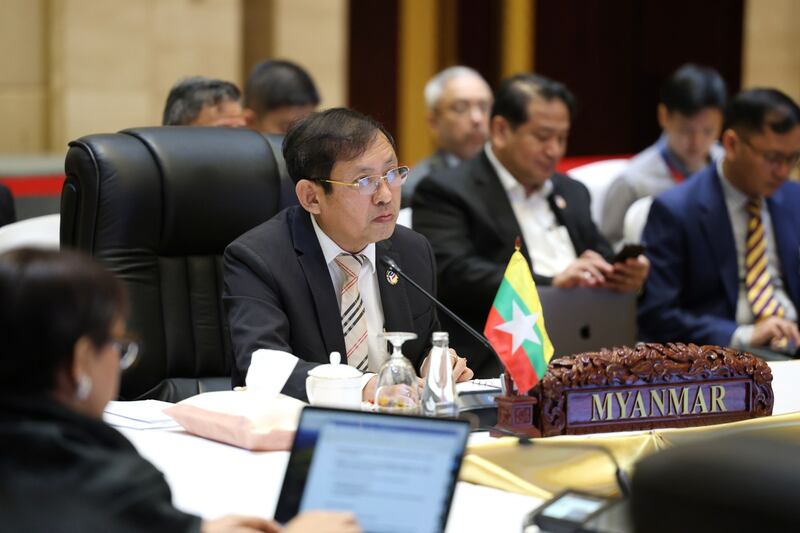UPDATED at 10:50 a.m. ET on Oct. 8, 2024.
This week’s ASEAN summit will serve as a test for the regional bloc’s ability to address two of its most pressing challenges: the crisis in Myanmar and escalating tensions in the South China Sea.
Opening a meeting of the group’s foreign ministers, Saleumxay Kommasith, Laos' deputy prime minister and foreign minister, underscored the urgency of effective collective action in addressing problems to ensure the group’s relevance.
“ASEAN’s concerted effort is needed to respond collectively and effectively to these challenges with a view to maintaining and promoting regional and global peace, stability and prosperity as well as maintaining ASEAN relevance and centrality as the primary driving force in evolving the architecture,” Saleumxay said.
RELATED STORIES
[ Laos’ ASEAN chairmanship propels foreign minister to PM contenderOpens in new window ]
[ Thailand’s offer of aid to Myanmar gets mixed reactionOpens in new window ]
[ Vientiane authorities remove Chinese language signs ahead of ASEAN meetingOpens in new window ]
Leaders of the 10-member ASEAN will gather later in the week with the Myanmar turmoil and tensions in the South China Sea expected to dominate debate.
The deliberations come as Myanmar’s civil war, sparked by an early 2021 military coup, grinds on with more civilians being killed and displaced and as confrontation in the South China Sea between an increasingly assertive China and two ASEAN members, the Philippines and Vietnam, raises fears of a serious clash.
ASEAN has tried to help resolve both problems but has little to show for its efforts.
Analysts say the need for “consensus-driven” decision-making in a bloc that includes countries with diverse political systems and foreign-policy objectives makes decisive collective action difficult.
“When it comes to more contentious issues, like the South China Sea dispute or the political crisis in Myanmar, ASEAN has shown significant weaknesses,” Isha Gharti, a public policy professor at Thailand’s Chiang Mai University, told Radio Free Asia.
“ASEAN must adapt its approach if it is to achieve tangible results.
“On issues like the South China Sea, ASEAN could strengthen its collective bargaining power by aligning the interests of its member states and speaking with a unified voice in negotiations with external powers like China.”
Confrontations at sea
Myanmar has frequently been at the heart of ASEAN deliberations since 1997, when it was admitted to the grouping in the hope that “constructive engagement” would foster reform more effectively than Western sanctions.
But the 2021 coup was a huge shock for ASEAN after a decade of tentative reform and quasi-civilian rule under Aung San Suu Kyi raised hope that Myanmar was on a path to peace and prosperity.
Stepping in to try to help its fellow member, ASEAN proposed a five-point peace plan, which the grouping calls a “consensus,” including a ceasefire and talks, but Myanmar’s generals have ignored it, battling on against a loose alliance of ethnic minority forces and pro-democracy fighters who have this year been making significant battlefield gains.
China, with extensive economic interests in Myanmar, has been playing a much more influential role there than ASEAN has.
China has managed to organize limited talks and several short-lived ceasefires in Shan state, on northeastern Myanmar’s border with China. A former Myanmar military leader, Senior Gen. Than Shwe, made a surprise call in August for China to help Myanmar end its internal conflict and bring stability.
Myanmar has brushed off repeated attempts by ASEAN to press for talks.
In response, ASEAN has barred the leaders of Myanmar’s junta from its summits. Aung Kyaw Moe, permanent secretary of the Myanmar foreign ministry, is representing his country at this week’s gathering in Laos.

On the South China Sea, ASEAN has been trying to negotiate a “code of conduct” with China, which claims almost the entire waterway as its territory.
In the meantime, China is sending out vessels, including into the exclusive economic zones of ASEAN members, the Philippines and Vietnam, and violent confrontations have been occurring more frequently.
“Negotiations on the code of conduct continue at a snail’s pace,” former Thai Foreign Minister Kantathi Suphamongkhon told the Reuters news agency.
Chinese Premier Li Qiang and U.S. Secretary of State Antony Blinken are due to join the meeting, along with leaders of major regional powers, later in the week.
A State Department official told reporters Tuesday he did not expect any one-on-one talks between Blinken and Wang on the sidelines of the two summits in Vientiane, with the pair having recently met during the U.N. General Assembly in New York last month.
Blinken’s focus during the summits would be the Myanmar civil war and “China’s continuing to take a number of escalatory and irresponsible steps designed to coerce and pressure many of the South China Sea claimants,” the official said.
Edited by Mike Firn and Taejun Kang. Alex Willemyns contributed reporting from Washington.
